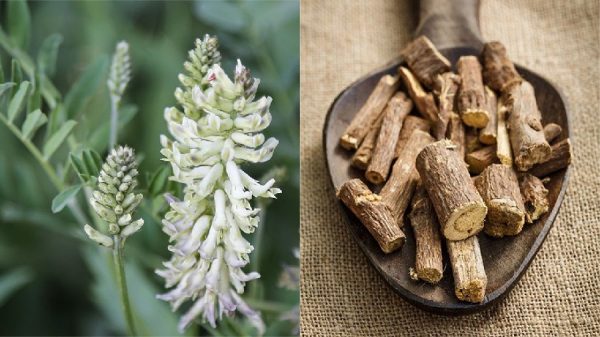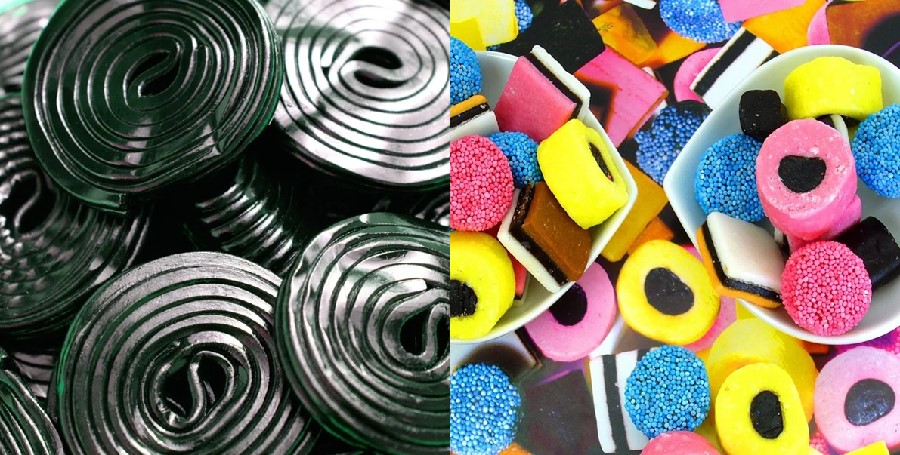
Health benefits of Licorice root -Mulethi Jeshtamadhu
Licorice, Liquorice is a perennial herb that has multiple health benefits. It is used in home remedies, Ayurvedic medicines and as a flavoring agent because of its sweetness. Licorice is known for its antidiabetic and antioxidant properties. It supports and boosts immune system. Apart from these there are other many other health benefits of mulethi, licorice root.
Licquorice is also known as gancao (sweet herb). The other popular name for this herb is jeshthamadhu, yshtimadhu, madhuka. It belongs to Glycyrrhiza species (Gl uralensis, G. inflata)and contains glycyrrhizin.
In Ayruveda, licorice has many applications including complexion promoter, voice promoter, preventing allergy, as antiseptic, for giving strength, eye health promotion, to enhance fertility, good for hair and in pain related to stomach ulcers. Licorice root is available in powdered and raw forms. It has found its way in Indian kitchens as a natural flavoring agent, as sweetener and for its superb health benefits. Licorice is available in the form liquid extracts, infused in candies, lollipops, tablets and capsules in Western countries.
Black licorice, is a form of jerky/candy available in market for chewing purposes. A black licorice generally is made of liquorice extract, sugar, and a binder. It might contain have gum Arabic, starch flour, beeswax, molasses.

Good for respiratory health: Chewing licorice sticks is a traditional method of healing for sore throat. It is useful in curing cough and bronchitis. Promotes breathing in asthma patients. Consuming licorice powder and ginger juice mix tea helps to reduce allergy infections.
Good for metabolism: Presence of carbenoxolone and glycyrrhizin (glycyrrhizic acid) helps to improve digestion and increases metabolism. Its laxative effect stimulates bowel movements. It reduces heartburn, acidity, discomfort, bloating and flatulence in stomach.
For nervous system: It is believed that licorice is good for central nervous system and promotes memory. It helps in cognition and prevents early dementia and Alzheimer’s condition.
Anti-inflammatory properties: Chronic inflammation related to arthritis, joint pain and other chronic pain types of conditions can be treated with licorice root. It reduces the body inflammation.
Oral disease: Licorice roots are good for oral health particularly in controlling teeth decay, gingivitis, oral ulcers and gum disease.
Good for skin: For improving skin texture, mulehti powder is a good remedy. Mixing mulethi powder with turmeric powder, milk cream and applying on pigmented area reduces pigmentation. It flushes toxins from skin and reduces acne, eczema, pimples and rashes. Licorice powder can also be mixed with honey or yogurt to apply on face. One should avoid touching eyes.
Good for women: It promotes hormonal balance in menopause stage. It is a remedy for mood swings, heart flash, sweating, insomnia – these symptoms will reduce by consuming licorice.
Immunity booster: Chemicals present in lycorice promote white blood cells and thus supports immune system health. It helps to produce macrophages and lymphocytes thus prevents infections and allergies.
Cholesterol control: Mulethi’s compounds promote good cholesterol and promotes heart health. Because of its anti-inflammatory properties, licorice is believed to promote blood circulation.
Various research studies on licorice contents say that the presence of secondary metabolites in licorice root have a positive influence of several condition including tuberculosis, atherosclerosis, gastric ulcer, immunodeficiency, bacterial infections and even on cancer.
Consuming licorice has any side effect of licorice? According to health experts too much consumption of lycorice can increase glycemic index. It can lower potassium level that leads to arrhythmia and affect heart.
Image credit: Image by gate74 from Pixabay (CC by 0)
Plant image: https://commons.wikimedia.org/wiki/File:Glycyrrhiza_lepidota_Wild_licorice_close.jpg
Attribution: Dcrjsr, CC BY 4.0 <https://creativecommons.org/licenses/by/4.0>, via Wikimedia Commons
Candies: Image by Shirley Hirst from Pixabay (Cc by 0) & Image by Nat Aggiato from Pixabay
Author: HealthyLife | Posted on: January 21, 2021
« Home Remedies and Many Benefits of Herb Coriander 19 Remedies to control Hiccups »






















Write a comment